|
|
|
Sort Order |
|
|
|
Items / Page
|
|
|
|
|
|
|
| Srl | Item |
| 1 |
ID:
137507
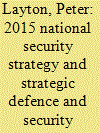

|
|
|
|
|
| Summary/Abstract |
In devising the 2015 National Security Strategy (NSS) and Strategic Defence and Security Review (SDSR), British decision-makers have a choice between trying to shape international affairs to be more favourable or instead planning to respond meaningfully to events that arise. The former grand strategic approach appears favoured however, the latter risk management approach remains the basis for work. That the two approaches are incompatible, distinctly dissimilar and would yield markedly different NSS and SDSR outcomes is generally overlooked. Moreover, opportunism, a third viable approach has been neglected. This article evaluates the three approaches, ascertains their principal advantages and weaknesses and outlines three alternative NSSs and SDSRs based on the different approaches.
|
|
|
|
|
|
|
|
|
|
|
|
|
|
|
|
| 2 |
ID:
137939
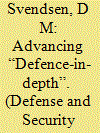

|
|
|
|
|
| Summary/Abstract |
This article aims to encourage the fostering of more systems thinking, and its greater exploitation, within the domain of contemporary intelligence. With particular focus on “micro systems thinking” and with reference to key intelligence processes, such as intelligence analysis, the utility of many systems dynamics within the intelligence context seeks to be further revealed. Through their greater collective harnessing, including up to “System of Systems” (“SoS”) dynamics, and promoting all that they can offer, more sophisticated overarching operational-to-strategic/policy “ends,” notably that of “defence-indepth,” can be viably further advanced in a sustainable manner into the future. Arguably, a much-needed transformative impact on contemporary intelligence can also be increasingly realised through comprehensively engaging in and with more systems and SoS thinking. Aiding civil protection tasks, crisis management, emergency planners, and civil contingency practitioners likewise gain.
|
|
|
|
|
|
|
|
|
|
|
|
|
|
|
|
| 3 |
ID:
076163
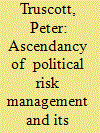

|
|
|
|
|
| Publication |
London, IISS, 2006.
|
| Description |
viii, 146p.
|
| Standard Number |
0855161272
|
|
|
|
|
|
|
|
|
|
|
|
Copies: C:1/I:0,R:0,Q:0
Circulation
| Accession# | Call# | Current Location | Status | Policy | Location |
| 052246 | 332.673/TRU 052246 | Main | On Shelf | General | |
|
|
|
|
| 4 |
ID:
137276
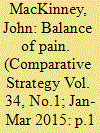

|
|
|
|
|
| Summary/Abstract |
More than any other modern nation, Israel has combatted, prevented, countered, and deterred terrorist attacks. While the conflict that spawns terrorism did not begin with the founding of modern Israel, its establishment by United Nations resolution in 1948 has certainly become the contemporary trigger point for this ancient antipathy. Israel has attempted different tactical and strategic approaches to halt attacks, including deterrence, but, in contrast to what U.S. strategists might initially suppose from their Cold War experience, Israeli deterrence of terrorism does not fall into either the Kahn or Schelling schools of thought. It has more affinity to risk management, and kinship with deterrence of crime in a civil legal system. Like criminal law enforcement, the expectation of Israeli terror deterrence is not unrealistically zero attacks, but practical management to maintain a certain status quo. Israel, however, appears trapped in an endless cycle of pain with its adversaries, a cycle regulated by unspoken rules. This article evaluates the Israeli experience in terrorism deterrence, and concludes with observations concerning efforts to protect the U.S. homeland.
|
|
|
|
|
|
|
|
|
|
|
|
|
|
|
|
| 5 |
ID:
070672


|
|
|
|
|
| Publication |
Santa Monica, Rand Corporation, 1993.
|
| Description |
xv, 30p.
|
| Standard Number |
0833013963
|
|
|
|
|
|
|
|
|
|
|
|
Copies: C:1/I:0,R:0,Q:0
Circulation
| Accession# | Call# | Current Location | Status | Policy | Location |
| 035328 | 358.41820973/GLE 035328 | Main | On Shelf | General | |
|
|
|
|
| 6 |
ID:
101748
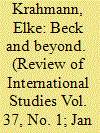

|
|
|
|
|
| Publication |
2011.
|
| Summary/Abstract |
Expanding on the works of Beck and others on the growing business of risk, this article examines the role of the private security industry in the creation, management and perpetuation of the world risk society. It observes that the replacement of the concept of security with risk over the past decades has permitted private firms to identify a growing range of unknown and unknown-unknown dangers which cannot be eliminated, but require permanent risk management. Using the discourse of risk and its strategies of commercialised, individualised and reactive risk management, the private risk industry thus has contributed to the rise of a world risk society in which the demand for security can never be satisfied and guarantees continuous profits.
|
|
|
|
|
|
|
|
|
|
|
|
|
|
|
|
| 7 |
ID:
100693
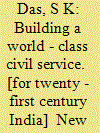

|
|
|
|
|
| Publication |
New Delhi, Oxford University Press, 2010.
|
| Description |
xvi, 269p.
|
| Standard Number |
9780198068662, hbk
|
|
|
|
|
|
|
|
|
|
|
|
Copies: C:1/I:0,R:0,Q:0
Circulation
| Accession# | Call# | Current Location | Status | Policy | Location |
| 055536 | 352.630954/DAS 055536 | Main | On Shelf | General | |
|
|
|
|
| 8 |
ID:
107472
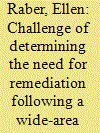

|
|
|
|
|
| Publication |
2011.
|
| Summary/Abstract |
Recovering from a biological attack is a complex process requiring the successful resolution of numerous challenges. The Interagency Biological Restoration Demonstration program is one of the first multiagency efforts to develop strategies and tools that could be effective following a wide-area release of B. anthracis spores. Nevertheless, several key policy issues and associated science and technology issues still need to be addressed. For example, more refined risk assessment and management approaches are needed to help evaluate "true" public health risk. Once the risk is understood, that information can be considered along with the types of characterization activities deemed necessary to determine whether the cost and time of decontamination are actually warranted. This commentary offers 5 recommendations associated with decision making regarding decontamination and clearance options that should accompany a comprehensive risk analysis leading to more effective risk management decisions. It summarizes some of the most important technological gaps that still need to be addressed to help decision makers in their objective of reducing health risks to an acceptable level. The risk management approach described should enable decision makers to improve credibility and gain public acceptance, especially when an adequate science and technology base is available to support the required decisions.
|
|
|
|
|
|
|
|
|
|
|
|
|
|
|
|
| 9 |
ID:
108496
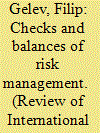

|
|
|
|
|
| Publication |
2011.
|
| Summary/Abstract |
After the terrorist attacks of 11 September 2001 Ulrich Beck placed terrorism alongside other potentially catastrophic events such as global warming, nuclear disaster, and influenza as one of the 'dimensions' of risk society. In risk society, executive governments take 'precautionary measures' and parliaments pass 'preventative laws' allowing them to accumulate information, detain terrorism suspects, freeze funds and prohibit various groups, in order to stop catastrophic risks from eventuating. International Relations and legal scholars have used risk society theory or the ideas of Michel Foucault to criticise such excesses of the executive and parliamentary branches of government. Most studies either ignore the judiciary or argue that it stands in opposition to the other branches of governments, that it imposes checks and balances in order to uphold the rule of law and protect individual rights. The article argues that this view is naïve and does not acknowledge a long history of judicial deference to the will of the executive and parliament. Through an analysis of case law from Australia and Canada the article explores parallels between early 21st century judicial reasoning and previous periods of crisis, including the Cold War, while identifying some new 'precautionary approach' aspects. The judiciary defers to the executive, asserts that the executive is more accountable than it, and seeks to avoid responsibility for engaging in this 'precautionary justice'. Furthermore, seized by the same fear of terrorism as executive governments, the judiciary shows an ability to adapt existing legal concepts to the exigencies of risk society. The article concludes that as the memory of the 9/11 attacks fades some of the most draconian preventative measures may be scaled back but the judiciary cannot be relied on to keep the executive or parliament in check.
|
|
|
|
|
|
|
|
|
|
|
|
|
|
|
|
| 10 |
ID:
118185


|
|
|
| 11 |
ID:
180122
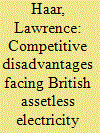

|
|
|
|
|
| Summary/Abstract |
From the outset of deregulation and privatisation of UK electricity markets, the desired extent of vertical integration has been debated. Concerns over the dominance of the “Big Six” majors and whether consumers were receiving a fair deal, led the new Government of 2010 to promote the entry of new retail supply firms without generation assets. Increasing consumer choice and facilitating supplier switching were seen as counter-weights to the dominance of the vertically integrated majors. Through various policies favouring new, assetless suppliers, the domestic retail electricity market in the UK has become less concentrated offering more choice to consumers. But the process of reducing market concentration has had setbacks: many new retail suppliers went bankrupt and service quality has been mixed. To address possible short-comings, the Regulator in mid-2019 introduced stricter requirements for a retail supply license but are they sufficient? Combining theory with empirical analysis, it is argued that enhanced requirements are unlikely to be sufficient to ensure the success of these new firms because assetless retailers face competitive disadvantages under the current market structure. Before debating the role and benefits of such firms, their economic viability should be assessed.
|
|
|
|
|
|
|
|
|
|
|
|
|
|
|
|
| 12 |
ID:
160735
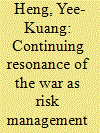

|
|
|
|
|
| Summary/Abstract |
In the late 1990s and 2000s, a slew of books and journal articles proposed that a nexus between risk management and warfare was emerging. This article argues that risk management ideas continue to shape recent campaigns against Libya, Islamic State, Syria, and the war on terror from Niger, Yemen to Somalia. It uses existing literature on risk and warfare to examine four key aspects of contemporary interventions. First, the article evaluates the overall strategic context as security concerns shift from terrorism toward renewed great power competition. Second, it re-assesses the risk calculus for military action through the language and grammar of risk invoked by politicians. Third and fourth, it addresses the continuing reliance on air power and the managerial ethos of military operations as important features of war as risk management.
|
|
|
|
|
|
|
|
|
|
|
|
|
|
|
|
| 13 |
ID:
119335


|
|
|
| 14 |
ID:
107740
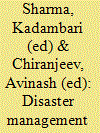

|
|
|
|
|
| Publication |
New Delhi, Jnanada Prakashan, 2010.
|
| Description |
327p.
|
| Standard Number |
9788171393978, hbk
|
|
|
|
|
|
|
|
|
|
|
|
Copies: C:1/I:0,R:0,Q:0
Circulation
| Accession# | Call# | Current Location | Status | Policy | Location |
| 056239 | 363.340954/SHA 056239 | Main | On Shelf | General | |
|
|
|
|
| 15 |
ID:
094841


|
|
|
|
|
| Publication |
2010.
|
| Summary/Abstract |
In 2004, the reform of the Brazilian Electricity Market underwent a thorough revision. One of its causes was the electricity rationing that began in June 2001 and lasted until February 2002. Among other measures, the 2004 revision devised new mechanisms intended to reduce risks associated to contracts settled in electricity auctions and those related to investments in new generation plants. As 4 years have passed since the onset of the reform's revision, sufficiently enough data are now available for an analysis of the post-revision dynamics of the Brazilian Electricity Market. This is the purpose of the present paper. We focus on the dynamics of the different types of electricity auctions and on the so-called Mechanism for Compensation of Surpluses and Deficits, both created in the wake of the 2004 revision. The ultimate goal is to understand the behavior of the agents involved in auctions - notably buyers and sellers of electricity - and propose remedial actions to eliminate existing loopholes in the present regulatory framework. To achieve this goal, four steps were necessary. Firstly, a data base to support the analysis was built. Then, the main drivers of the dynamics of the risk management tools were identified. Finally, consequences of the implemented changes were discussed and corrections for observed pitfalls proposed.
|
|
|
|
|
|
|
|
|
|
|
|
|
|
|
|
| 16 |
ID:
100862
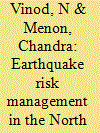

|
|
|
| 17 |
ID:
161466
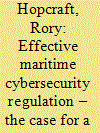

|
|
|
|
|
| Summary/Abstract |
Ships and ports are increasingly connected to each other through cyberspace. This connectivity streamlines many aspects of maritime business, but also exposes maritime operators and administrations to new types of risk including hacking and outage. The maritime industry has been slow to realize the implications of this new environment within which it operates, and now lags behind other industries (like aviation) when it comes to cyber risk mitigation and regulation. We argue that the International Maritime Organisation (IMO), alongside its members, urgently needs to create robust and resilient cybersecurity regulations. We suggest that the IMO should consider creating a standalone Cyber Code, based on a framework created by previous IMO Codes such as the Polar Code. Since the IMO uses Codes as a legally binding instrument, this would help to ensure the continued safety and efficiency of the maritime industry in the face of threats from cyberspace.
|
|
|
|
|
|
|
|
|
|
|
|
|
|
|
|
| 18 |
ID:
069813
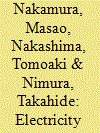

|
|
|
| 19 |
ID:
025726
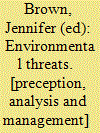

|
|
|
|
|
| Publication |
London, Belhaven Press, 1989.
|
| Description |
154p.
|
| Standard Number |
0852930152
|
|
|
|
|
|
|
|
|
|
|
|
Copies: C:1/I:0,R:0,Q:0
Circulation
| Accession# | Call# | Current Location | Status | Policy | Location |
| 030236 | 333.715/BRO 030236 | Main | On Shelf | General | |
|
|
|
|
| 20 |
ID:
127194


|
|
|
|
|
| Publication |
2014.
|
| Summary/Abstract |
The recent push to develop unconventional sources of oil and gas both in the U.S. and abroad via hydraulic fracturing ("fracking") has generated a great deal of controversy. Effectively engaging stakeholders and setting appropriate policies requires insights into current public perceptions of this issue. Using a nationally representative U.S. sample (N=1061), we examine public perceptions of hydraulic fracturing including: "top of mind" associations; familiarity with the issue; levels of support/opposition; and predictors of such judgments. Similar to findings on other emerging technologies, our results suggest limited familiarity with the process and its potential impacts and considerable uncertainty about whether to support it. Multiple regression analysis (r2=.49) finds that women, those holding egalitarian worldviews, those who read newspapers more than once a week, those more familiar with hydraulic fracturing, and those who associate the process with environmental impacts are more likely to oppose fracking. In contrast, people more likely to support fracking tend to be older, hold a bachelor's degree or higher, politically conservative, watch TV news more than once a week, and associate the process with positive economic or energy supply outcomes. Based on these findings, we discuss recommendations for future research, risk communication, and energy policy.
|
|
|
|
|
|
|
|
|
|
|
|
|
|
|
|
|
|
|
|
|